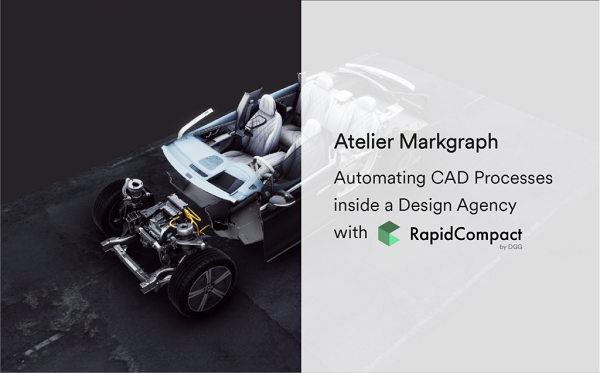
“We are able to save up to 80% time when using RapidCompact compared to a manual workflow”, Christoph Diederichs, Digital & Spatial Experience Designer at Atelier Markgraph.
Atelier Markgraph is a design agency that specializes on spatial communication, architecture and storytelling. Since their foundation in 1986, they have supported companies and institutions with their innovative, high-end work. In the past years, the creation of interactive applications including physical as well as virtual elements has come more to the fore. In cooperation with a variety of longstanding clients, they have designed many trade show experiences and product presentations involving 3D models of cars and their interior.
In their process of preparing 3D files for interactive experiences, Christoph and his team need to clean up the CAD data first, he says: “Often the data we receive is badly triangulated and it is not possible to generate proper UV maps because the proper seams are missing.” To fix this, they convert the models into mesh-based formats and then edit them in Cinema4D or Maya. For textures and materials, they use Adobe’s Substance Painter. Once the 3D model is cleaned up, a FBX or OBJ file is exported and optimized with RapidCompact for the visualization in real-time.
For many years, Christoph and his colleagues outsourced the optimization of 3D data for the final visualization to third parties. Today, RapidCompact makes it possible to keep the entire 3D content pipeline inhouse. This does not only give Atelier Markgraph more control over the process, but also saves significant amounts of resources, Christoph explains: “It is amazing to be able to upload your 3D model and receive an optimized file just 2 minutes later, compressed and with proper UV and normal maps. In general, when using RapidCompact in projects, you can cut the time needed in half, even with iterations and trying out different settings. In some projects with less complex 3D models we could even save up to 70-80% of the time.”

As agency, the projects Atelier Markgraph is working on can vary a lot from another. With that, also the demand for 3D model optimization can change over the course of the year. “Whenever it is interactive, it is necessary to process the models with RapidCompact. Especially, when it is done for iPads or similar target platforms”, Christoph elaborates, “The business model is perfect for agencies like ours with fluctuations in our demand for 3D model optimization. Also, because no tedious and expensive training is needed to use RapidCompact.”
With the automation RapidCompact offers, Atelier Markgraph is able to batch-process large groups of 3D models: “We are using the REST API with the python scripts that are available for RapidCompact. That was extremely comfortable to use, just throwing the folder in and putting in the command.”

For programming the interactive experience, Christoph relies on Unity as well as vvvv, a software he appreciates for the ease and speed with which changes can be made to existing applications. After all, it can always happen that a customer needs a last-minute change of their experience shortly before presenting it at an event.
Christoph appreciates RapidCompact also for enabling him to do the optimization himself: “It is possible to optimize 3D models without a super-specialized expert. I am fairly knowledgeable in 3D, however not specialized in mesh optimization, but now that I have learned how to operate RapidCompact, I am sure I can teach someone else quickly how to use it as well. This simplifies the skill-set that is necessary to do the optimization of 3D files.”
In the next years, 3D visualizations will become more accessible, Christoph says: “I believe it will become more mainstream, also because it will become easier to work and rework 3D content.”
Upload and process 3D models with the free web demo or get in touch if you have any question. We´re happy to help…
More about RapidCompactTry RapidCompact for FreeEnterprise Solutions